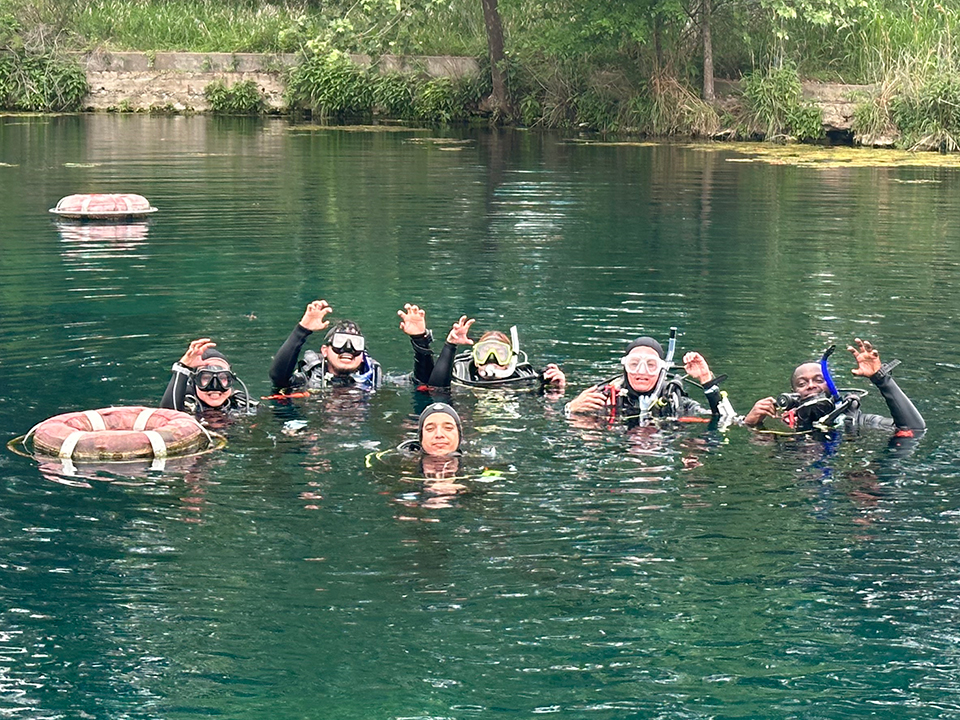Texas A&M University-San Antonio is rolling out a unique new course for Maymester that calls for venturing outside the classroom and exploring the depths of area lakes.
The Scientific Diving Course, which is part of the University's biology program, teaches students the theoretical and practical skills required to safely conduct biological and hydrological research utilizing scuba techniques.
“It’s knowledge that can be applied to a variety of careers and disciplines, including biology, criminology, and water research,” said Dr. Fernando Calderon-Gutierrez, a biologist and postdoctoral research fellow at A&M-San Antonio who is teaching the diving course. He also teaches a first aid/CPR course and a basic diving certification class, which are prerequisites for the Scientific Diving Course.
In addition, Calderon-Gutierrez serves as the University’s first Dive Safety Officer. He manages and oversees diving operations in accordance with safety standards set by the American Academy of Underwater Sciences as part of the dive program.
The Scientific Diving Course, which starts May 14, dedicates the first week to scuba diving physics and regulations. Students then participate in more field-intensive experiences, including diving in swimming pools as well as nearby Canyon Lake and Spring Lake, which provide a variety of conditions and opportunities to practice different research techniques. There’s also a visit to Sea World for a behind-the-scenes look at the amusement park’s diving operations.
Calderon-Gutierrez added that Zara Environmental is offering a paid internship to students finishing the Scientific Diving Course. The internship provides an opportunity to gain hands-on experience in scientific diving and field research at area rivers, lakes, and other freshwater environments.
 Taking the Plunge
Taking the Plunge
Angela Roth is a master’s student in biology, who is scheduled to graduate in the spring of 2026. She said that since she was a teenager she’s been “obsessed with the ocean and everything inside of it” and always dreamed of being a marine biologist.
But her plans were sidetracked after high school when she had kids and later served 11 years in the Navy.
“I decided to go to college at age 41,” she said. “It was hard at first, because all of my peers are my children's age. But I discovered a lot of other nontraditional students, and everyone has been very accepting. After I graduate, my goal is to end up somewhere like St. Croix in the Caribbean and do conservation and research work.”
Like Roth, William Joyner is a nontraditional student with a military background. He served in the Marines for 20 years, retiring in 2015. He transferred to A&M-San Antonio from Northwest Vista College this semester. He’s scheduled to graduate in the fall with a B.S. in criminal justice.
Already a diving instructor and public safety diver, Joyner said the Scientific Diving Course is an opportunity to learn more and sharpen his skills. “It will help me enhance my capabilities when doing dive searches for remains, weapons, and other evidence,” he said.
A Big Differentiator
While the upcoming Maymester course is already filled to capacity, future classes will be open to faculty and staff who need the course to conduct research.
“There is a lot of interest, and some of the University’s research projects require people who are trained scientific divers,” said Dr. Elizabeth Borda, associate professor in the Department of Natural Sciences who is working with Calderon-Gutierrez on the course.
The pair have worked together for years, including in 2022 when the University first used scientific diving as part of a collaborative research project with Woods Hole Oceanographic Institution to explore underwater caves. The two traveled to subterranean caves in the Yucatan Peninsula and Cozumel Island, Mexico, to study some of the strange and rarely seen creatures living in underwater caves.
Borda said the new scientific diving course is a big differentiator for A&M-San Antonio, as few other universities in the state offer a similar course. Looking ahead, she hopes to expand the diving program and offer it as a community service to organizations like the San Antonio River Authority and Texas Parks and Wildlife.
“We are providing students with skills they can’t get at any other local university,” she said. “And these are job-related skills for students who are interested in fields like aquatic sciences and marine biology.”
This includes Bernard Mbithi, an international graduate student from Kenya scheduled to graduate in the fall with an M.S. in biology. Previously, Mbithi worked as a high school teacher in Kenya, but always wanted to further his education at a U.S. university. He applied for the biology graduate program at A&M-San Antonio as well as universities in Tennessee and California.
“They all accepted me, but A&M-San Antonio gave me the best scholarship package,” he said.
Mbithi originally came to the University to study lizards and other reptiles but then took one of Borda’s classes that focused on marine organisms and changed his focus of study. He said the diving class gives him the advantage of being able to personally collect any biological samples he wants to study.
“Most divers aren’t biologists, but when I dive, I’m able to see and notice things a regular diver might miss,” he said.